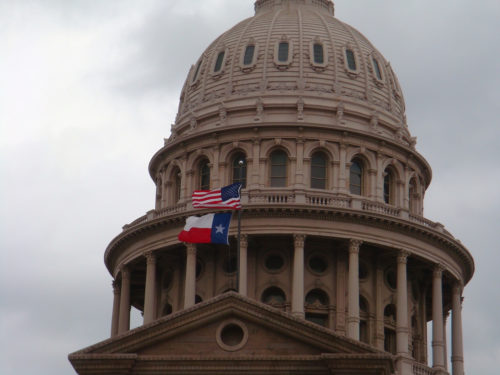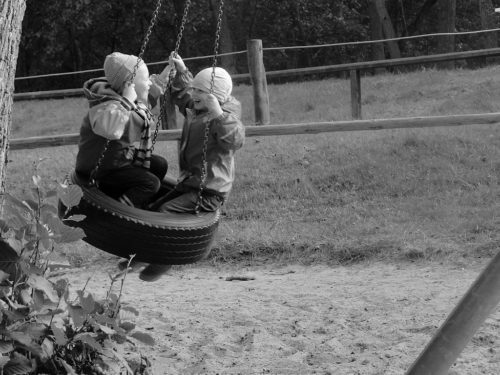AUSTIN, Texas — The Texas House of Representatives passed HB3859 Wednesday, moving the state one step closer to enacting a law that, as it reads, aims to protect the “rights of conscience for child welfare services providers.” The bill was authored by Rep. James Frank (R) from Wichita Falls and, as he stated in a recent comment, “One of our biggest challenges is a lack of adequate, quality foster homes. […] A substantial part of any answer to this problem will be found in the faith-based community.”

[Photo Credit: Jason Rosenberg / Flickr]
Texas has come under fire recently for not adequately protecting or providing for children placed in foster care. In March 2011, Children’s Rights, Inc, a national child advocacy group, sued the Texas Department of Family and Protective Services (DFPS) on behalf of children in permanent foster care, alleging that policies and standard practices exposed children to “unreasonable harm.”
In December 2015, a federal court ruled against Texas and concluded that Texas children “uniformly leave State custody more damaged than when they entered.”
The court cited abuse, suicide, poor supervision in institutional care, and lack of home placement options.
Since that 2015 ruling, Texas has attempted to address the situation by changing which outcomes are measured, and by increasing the number of participating private organizations providing foster care placement and adoption.
The outcomes being measured include placing children in a safe, home environment; not splitting up siblings; establishing respect for the child’s culture, and keeping children in their own communities in order that they can maintain ties with family and friends.
How does the new controversial bill fall into the state’s efforts to improve their child care services system? What does it say, and does it allow for discriminatory practices, as some claim?
Supporters of the bill say faith-based organizations are willing to help with the foster care crisis, but they have concerns that the state would force them to act in ways that would violate their beliefs.
The bill says the State of Texas will not take any punitive action against private child welfare organizations that:
Place children under guardians that provide or refuse to provide children with a religious education, including private schools.
Do not provide, facilitate, or refer a child for medical services they have a religious objection to such as immunizations, abortions, and contraceptives.
Place or refuse to place a child under a guardian that the organization has a religious objection to.
As it stands now, foster children in the state of Texas must be enrolled in public school. The bill would allow foster parents to enroll the child in any type of private school, including a religious one, as long as the foster parents or the supporting private child welfare organization pays the cost.
The religion of the child does not appear to be a factor in the decision, only the religious wishes of the foster parent.

[Photo Credit: Klaus27neu / Wikimedia]
DFPS covers the cost of these medical services, plus the cost of finding an alternative person to take the child to and from any such providers.
The section of the bill which has raised the most objections is the portion which allows child welfare organizations to discriminate based on religion, marital status, or sexual preference.
Presently, no tax funded child welfare provider can refuse to take in a child due to religion or sexual preference, nor can they refuse to place a child with a foster family due to the religion, sexual preference, or marital status of the foster family.
HB3859 would allow a tax funded, private child welfare organization to do just that. For example, a Christian foster care agency could refuse to allow a Pagan family to foster a child or may refuse to allow them to adopt the child at a later date.
However, the bill also states every region in Texas must have at least one non-religious foster care agency available. The bill does not say how they will ensure this, especially in the more rural areas of the state.
Should religion have any bearing on adoption or fostering? The Wild Hunt spoke with blogger John Beckett, a Druid and Unitarian Universalist living in Texas. In response to our questions, he wrote entire essay, which can be found on his blog in its entirety.
Beckett said that although he understands the sentiments behind the bill, he stands in opposition, “Its real world impact will be to make it harder for LGBT families, Pagan families, and other non-Christian families to adopt children.”
He also notes the issue is complicated. He explains:
Assume, for a moment, you’re working for an adoption agency. You place children with gay couples and straight couples, poly families and single people. You place them with UUs and Buddhists and Pagans, with Episcopalians and Methodists and atheists. If they’re loving and supportive and stable, orientation and religion just don’t matter.
And then a Southern Baptist couple walks in. They’re happy, healthy, and stable. They’re good people who no doubt will love a hold dearly and will do their best to give a child a good home.
But you know what their child will be taught: the few will go to heaven no many will burn in Hell. The Bible is perfect and without error. Being gay is a sin. Wives are to be be submissive to their husbands.
Do you still think that religion shouldn’t matter?
Current DFPS contracts with private child welfare organizations include explicit instructions on children’s rights, pharmacy services, behavioral health, psychotropic medications, trauma informed care, minimum standards for nutrition, minimal standards for clothing, discipline, education, immunizations, travel, religious activities of the child’s choosing, facility requirements, and civil rights.
However, with the state’s current child care services crisis, the court directives, and the need to keep children within 50 miles of their original home, Texas legislators are looking for options.
The controversial bill was approved by the state House of Representatives, and has cleared the state Senate committee, but has not yet been scheduled for a vote.
The Wild Hunt is not responsible for links to external content.
To join a conversation on this post:
Visit our The Wild Hunt subreddit! Point your favorite browser to https://www.reddit.com/r/The_Wild_Hunt_News/, then click “JOIN”. Make sure to click the bell, too, to be notified of new articles posted to our subreddit.